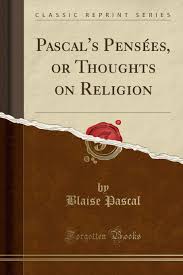Pensées Page #19
The Pensées is a collection of fragments on theology and philosophy written by 17th-century philosopher and mathematician Blaise Pascal. Pascal's religious conversion led him into a life of asceticism, and the Pensées was in many ways his life's work. The Pensées represented Pascal's defense of the Christian religion.
160 Sneezing absorbs all the functions of the soul, as well as work does; but we do not draw therefrom the same conclusions against the greatness of man, because it is against his will. And although we bring it on ourselves, it is nevertheless against our will that we sneeze. It is not in view of the act itself; it is for another end. And thus it is not a proof of the weakness of man, and of his slavery under that action. It is not disgraceful for man to yield to pain, and it is disgraceful to yield to pleasure. This is not because pain comes to us from without, and we ourselves seek pleasure; for it is possible to seek pain, and yield to it purposely, without this kind of baseness. Whence comes it, then, that reason thinks it honourable to succumb under stress of pain, and disgraceful to yield to the attack of pleasure? It is because pain does not tempt and attract us. It is we ourselves who choose it voluntarily, and will it to prevail over us. So that we are masters of the situation; and in this man yields to himself. But in pleasure it is man who yields to pleasure. Now only mastery and sovereignty bring glory, and only slavery brings shame. 161 Vanity.--How wonderful it is that a thing so evident as the vanity of the world is so little known, that it is a strange and surprising thing to say that it is foolish to seek greatness! 162 He who will know fully the vanity of man has only to consider the causes and effects of love. The cause is a je ne sais quoi (Corneille),[76] and the effects are dreadful. This je ne sais quoi, so small an object that we cannot recognise it, agitates a whole country, princes, armies, the entire world. Cleopatra's nose: had it been shorter, the whole aspect of the world would have been altered. 163 Vanity.--The cause and the effects of love: Cleopatra. 164 He who does not see the vanity of the world is himself very vain. Indeed who do not see it but youths who are absorbed in fame, diversion, and the thought of the future? But take away diversion, and you will see them dried up with weariness. They feel then their nothingness without knowing it; for it is indeed to be unhappy to be in insufferable sadness as soon as we are reduced to thinking of self, and have no diversion. 165 Thoughts.--In omnibus requiem quæsivi.[77] If our condition were truly happy, we would not need diversion from thinking of it in order to make ourselves happy. 166 Diversion.--Death is easier to bear without thinking of it, than is the thought of death without peril. 167 The miseries of human life have established all this: as men have seen this, they have taken up diversion. 168 Diversion.--As men are not able to fight against death, misery, ignorance, they have taken it into their heads, in order to be happy, not to think of them at all. 169 Despite these miseries, man wishes to be happy, and only wishes to be happy, and cannot wish not to be so. But how will he set about it? To be happy he would have to make himself immortal; but, not being able to do so, it has occurred to him to prevent himself from thinking of death. 170 Diversion.--If man were happy, he would be the more so, the less he was diverted, like the Saints and God.--Yes; but is it not to be happy to have a faculty of being amused by diversion?--No; for that comes from elsewhere and from without, and thus is dependent, and therefore subject to be disturbed by a thousand accidents, which bring inevitable griefs. 171 Misery.--The only thing which consoles us for our miseries is diversion, and yet this it the greatest of our miseries. For it is this which principally hinders us from reflecting upon ourselves, and which makes us insensibly ruin ourselves. Without this we should be in a state of weariness, and this weariness would spur us to seek a more solid means of escaping from it. But diversion amuses us, and leads us unconsciously to death. 172 We do not rest satisfied with the present. We anticipate the future as too slow in coming, as if in order to hasten its course; or we recall the past, to stop its too rapid flight. So imprudent are we that we wander in the times which are not ours, and do not think of the only one which belongs to us; and so idle are we that we dream of those times which are no more, and thoughtlessly overlook that which alone exists. For the present is generally painful to us. We conceal it from our sight, because it troubles us; and if it be delightful to us, we regret to see it pass away. We try to sustain it by the future, and think of arranging matters which are not in our power, for a time which we have no certainty of reaching. Let each one examine his thoughts, and he will find them all occupied with the past and the future. We scarcely ever think of the present; and if we think of it, it is only to take light from it to arrange the future. The present is never our end. The past and the present are our means; the future alone is our end.[78] So we never live, but we hope to live; and, as we are always preparing to be happy, it is inevitable we should never be so. 173 They say that eclipses foretoken misfortune, because misfortunes are common, so that, as evil happens so often, they often foretell it; whereas if they said that they predict good fortune, they would often be wrong. They attribute good fortune only to rare conjunctions of the heavens; so they seldom fail in prediction. 174 Misery.--Solomon[79] and Job have best known and best spoken of the misery of man; the former the most fortunate, and the latter the most unfortunate of men; the former knowing the vanity of pleasures from experience, the latter the reality of evils. 175 We know ourselves so little, that many think they are about to die when they are well, and many think they are well when they are near death, unconscious of approaching fever,[80] or of the abscess ready to form itself. 176 Cromwell[81] was about to ravage all Christendom; the royal family was undone, and his own for ever established, save for a little grain of sand which formed in his ureter. Rome herself was trembling under him; but this small piece of gravel having formed there, he is dead, his family cast down, all is peaceful, and the king is restored. 177 [Three hosts.[82]] Would he who had possessed the friendship of the King of England, the King of Poland, and the Queen of Sweden, have believed he would lack a refuge and shelter in the world? 178 Macrobius:[83] on the innocents slain by Herod. 179 When Augustus learnt that Herod's own son was amongst the infants under two years of age, whom he had caused to be slain, he said that it was better to be Herod's pig than his son.--Macrobius, Sat., book ii, chap. 4. 180 The great and the humble have the same misfortunes, the same griefs, the same passions;[84] but the one is at the top of the wheel, and the other near the centre, and so less disturbed by the same revolutions.
Translation
Translate and read this book in other languages:
Select another language:
- - Select -
- 简体中文 (Chinese - Simplified)
- 繁體中文 (Chinese - Traditional)
- Español (Spanish)
- Esperanto (Esperanto)
- 日本語 (Japanese)
- Português (Portuguese)
- Deutsch (German)
- العربية (Arabic)
- Français (French)
- Русский (Russian)
- ಕನ್ನಡ (Kannada)
- 한국어 (Korean)
- עברית (Hebrew)
- Gaeilge (Irish)
- Українська (Ukrainian)
- اردو (Urdu)
- Magyar (Hungarian)
- मानक हिन्दी (Hindi)
- Indonesia (Indonesian)
- Italiano (Italian)
- தமிழ் (Tamil)
- Türkçe (Turkish)
- తెలుగు (Telugu)
- ภาษาไทย (Thai)
- Tiếng Việt (Vietnamese)
- Čeština (Czech)
- Polski (Polish)
- Bahasa Indonesia (Indonesian)
- Românește (Romanian)
- Nederlands (Dutch)
- Ελληνικά (Greek)
- Latinum (Latin)
- Svenska (Swedish)
- Dansk (Danish)
- Suomi (Finnish)
- فارسی (Persian)
- ייִדיש (Yiddish)
- հայերեն (Armenian)
- Norsk (Norwegian)
- English (English)
Citation
Use the citation below to add this book to your bibliography:
Style:MLAChicagoAPA
"Pensées Books." Literature.com. STANDS4 LLC, 2024. Web. 26 Nov. 2024. <https://www.literature.com/book/pens%C3%A9es_114>.




Discuss this Pensées book with the community:
Report Comment
We're doing our best to make sure our content is useful, accurate and safe.
If by any chance you spot an inappropriate comment while navigating through our website please use this form to let us know, and we'll take care of it shortly.
Attachment
You need to be logged in to favorite.
Log In